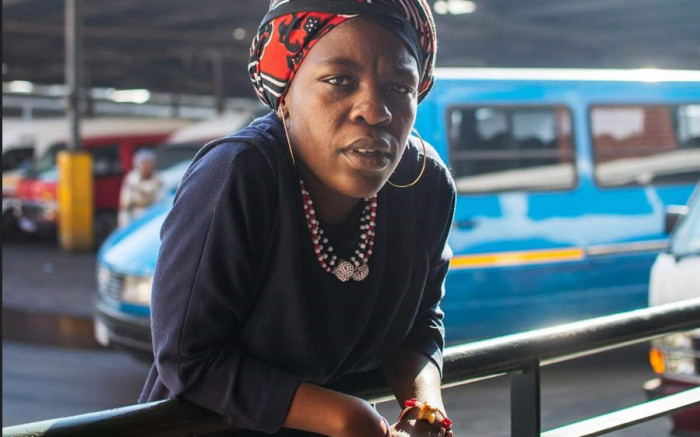Brunch with Gogo Mahlodi: A conversation about spiritual hygiene
Eyewitness News caught up with Gogo Mahlodi, who will be hosting a brunch on spiritual hygiene and the body as a site of ancestral communication.
Vuyiswa Xekatwane, also known as Gogo Mahlodi. Picture: Supplied.
JOHANNESBURG – One can with ease talk about good physical hygiene, the habits needed in order to have good health – for example eating well, exercise, cleanliness, and the right amount of sleep.
But what about one’s spiritual hygiene? How does one go about cleansing the spirit?
Eyewitness News caught up with Gogo Mahlodi, who will be hosting a brunch on spiritual hygiene and the body as a site of ancestral communication this week.
“Born out of the realisation that many people raised in the urban context of cities often face similar issues of displacement and knowledge gaps regarding culture and their spiritual identity, Brunch with Gogo Mahlodi seeks to create a platform that allows for knowledge sharing and community building through intimate conversations around spirituality,” said Gogo Mahlodi.
Taking place on 30 April at Native Rebels in Soweto, the second installment of Brunch with Gogo Mahlodi will focus on spiritual hygiene, bringing into focus the body as a site and tool of ancestral communication.
According to Ancestral Voices, communication takes place in various ways, including dreams, visions, synchronicities, nature, signs and sounds.
“From our dreams to our intuition, there are many ways in which our ancestors communicate with us. At Brunch with Gogo Mahlodi, we’ll be looking particularly at the ways in which our bodies are a site of ancestral communication,” Mahlodi said.
Ancestors give Africans a shared and personal sense of self-affirmation, identity and belonging.
Eyewitness News asked Gogo Mahlodi what role they play in today’s society and whether rituals like slaughtering an animal to appease the ancestors are necessary.
“Well, I think it’s firstly important to have an understanding of not just the role of our ancestors in our lives, but of their place in the larger context of African spirituality. If we understand isintu as a cosmological and overarching way of life, then we have a clear understanding of what rituals of slaughter are, and what animal cruelty is,” Mahlodi explained.
Professor of indigenous African religions at Harvard Divinity School, Jacob Olupona, pointed out that despite many Africans having embraced religions that are not indigenous to them a few centuries back, they still attach enormous honour to ancestors. Although today, Christianity and Islam are the most dominant religions in Africa, ancestors are still important for most Africans.
Vuyiswa Xekatwane, also known as Gogo Mahlodi, points out that one does not need to pick between Christianity and being a traditional healer.
“Not at all. In South Africa, there are many healers who consider themselves Christians, who not only participate in their communities of faith but who also work within those communities as healers. I think another distinction to be made is that Christianity is a religion, whereas indigenous practices such as traditional healing are more about a way of being and a way of living with others. Isintu is not a religion, a belief system yes, but not a religion. That’s important to understand,” she said.
In the Harvard Gazette, Professor Olupona further points out that African religion is ancestor worship; that is, funeral preparations, burial of the dead with ceremony and pomp, belief in the eternal existence of souls of the dead as ancestors, periodic remembrance of ancestors, and belief that they influence the affairs of their living descendants.
Gogo Mahlodi affirms this and said: “Amadlozi (ancestors) play a significant role in our lives, whether people have an understanding or acknowledgment of them or not. On a basic and scientific level, amadlozi influence various things from our physical appearance to our personalities and of course, on a deeper, spiritual level amadlozi can have an influence on our life’s trajectory.”
A person’s identity is made up of their own character combined with their family and social roots. Identity, like culture, is ever-changing.
“How can you know where you’re going if you don’t know where you come from? There is a deep and sacred intelligence to the ways our ancestors did things. An intelligence that considers our relationships with nature and the four elements, an intelligence that is also often led by the need to solve very practical problems.”
Ancestors are held in high esteem in Africa, as it is known that by calling on these energies and maintaining a relationship with your ancestors, they can assist their descendants and communities.
The philosophy is that life is a cycle of birth, death, and rebirth, meaning the spirit never dies. The family unit is composed of both the living and the departed, the essence of the departed is ever-present.
After four years of practice as isangoma in Johannesburg, she presents Brunch with Gogo Mahlodi where she seeks to answer questions such as how do our environments and consumption affect our spiritual wellness? What does it mean to be spiritually hygienic? How do we nurture our spiritual health?
“I hope more than the knowledge sharing that will take place at the workshops, people realise that they are not alone. Many of us, especially in the city, have similar questions and yearnings when it comes to ancestral memory and knowledge. I’m hoping that we can commune, give thanks for sustenance and begin to foster real community or at least be encouraged to do so. Knowledge is available to us in someone ways, but we have to engage our communities. I hope that’s what people will walk away with,” said Gogo Mahlodi.
For all the latest lifestyle News Click Here

